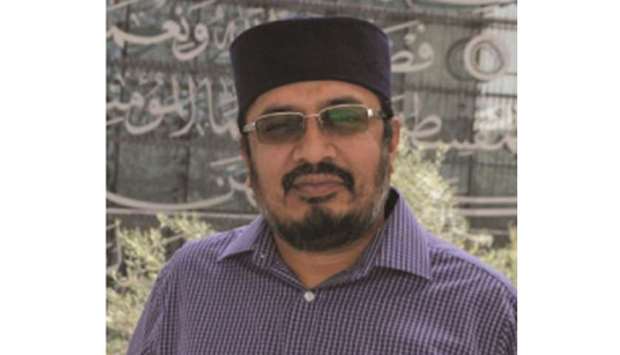Ibn Hajar al-Asqalani, a renowned Muslim scholar of hadith (Prophetic Tradition) and genealogies (Ans?b), captured the plague of the year 833 AH/1430 CE as it unfolded in Egypt and the surrounding areas in his Inb?’ al-Ghumr with some meticulousness.
Among other details, he followed the exponential rise in the number of deaths in Cairo, where the death rate rose from 12 per day to 50 then to 300 until it reached a cruel 1,800 casualties per day.
He made two further social observations: people had so despaired of life that the rich and poor alike were literally seen waiting in distress to be swallowed by death; and that there was a marked increase in deaths immediately after large gatherings of people.
Although not a particularly heartening opening to a piece on how we could celebrate our upcoming Eid festival during the lockdown, it does drive home a point. Muslim communities have witnessed far more gruelling, our plague-ridden Doha seems so much safer and tranquil and we can’t thank our Merciful Lord enough for that.
Eid is God’s gift to us Muslims. The Prophet Muhammad (peace be upon him) is reported to have said that every nation has its festivals and that these two, Eid al-Fitr and Eid al-Adha, are our festivals.
Ideally, having spent a whole month practising intense restraint and calibrating one’s spiritual bearings and relationship with God and his creatures, we have in return been afforded the joyous opportunity by our Benevolent Lord to celebrate in thanksgiving.
Abu Huraira (may God be pleased with him) narrated from the Prophet (PBUH) that, “when it is day of Eid al-Fitr, angels stand at the cross points of the roads and call out ‘O Muslims! Proceed early to the Compassionate Lord, who enjoins goodness and rewards amply for it. He prescribed fasting upon you and you fasted and obeyed Your Lord. Now, get hold of your rewards.’ After they have completed their Eid prayers, a voice is heard from the heavens ‘Return to houses having been guided; all your sins have been forgiven’ and that day is called the ‘Day of rewards’ in the heavens.”
The mere fact that Eid al-Fitr is organically related to a season of intense worship and self-reflection, means it is only naturally incumbent that the lessons learned in Ramadan are manifested most glaringly during this celebration. Yet in the flow of things, we have often tended to ‘let go’ as if tossing off a cloak of God-consciousness that we had donned during Ramadan and with the holy month gone we could now start getting back to a ‘normal lifestyle’.
This Eid affords us the perfect opportunity to not ‘let go’ but to get busy with consciously translating the lessons learned in Ramadan to a post-Ramadan lifestyle and what better occasion to start than the day of Eid itself. Having experienced a whole month of spiritual elevation and God-consciousness, that should not be much of a challenge.
There are aspects of Eid that need not change – whether or not we are facing Covid-19. Buy yourselves a new pair of clothes; no lockdown can snatch that right of ours. After performing the Fajr prayers, take a bath, wear your new clothes, get your children together and eat some sweets in accordance with the Sunnah of the Prophet (PBUH).
Since Eid prayers can be performed individually, get your immediate family or friends (in case of individuals) together, and perform the Eid prayer. Remind yourself and others of those who are not as fortunate as you, whose family and loved ones might not be with them or who could not afford to buy themselves a new dress or a decent meal; perhaps your gardener, your household help, or the workers you see in your vicinity, the list is endless.
Eid is also a time to reconnect with one’s extended family and friends in celebration. The Qatari government has recently announced specific measures regarding social movement during the Eid period. Social distancing would, therefore, be the norm and public and social gatherings would continue to be discouraged. Fortunately for us, technology comes in very handy in such a situation. Stay at home, enjoy the company of your children, and share your Eid experience through messages, pictures, and video calls with others. Do not let your inability to meet a loved one in person weaken your resolve to act responsibly.
It remains to be said that the measures taken by the State of Qatar to ensure the safety of its citizens and residents in the face of Covid-19 have proven their efficacy beyond a shadow of a doubt. It is for us to respond with the same spirit of joyous self-restraint that this Ramadan has so beautifully taught us.
Dr Mohamed Modassir Ali is a Senior Researcher at the Mohamed Bin Hamad Al Thani Center for Muslim Contribution to Civilization, College of Islamic Studies, Hamad Bin Khalifa University. He has a PhD in Comparative Religion from the International Islamic University, Islamabad.
(This article is submitted on behalf of the author by the HBKU Communications Directorate. The views expressed are the author’s own and do not necessarily reflect the University’s official stance).

Dr Mohamed Modassir Ali
